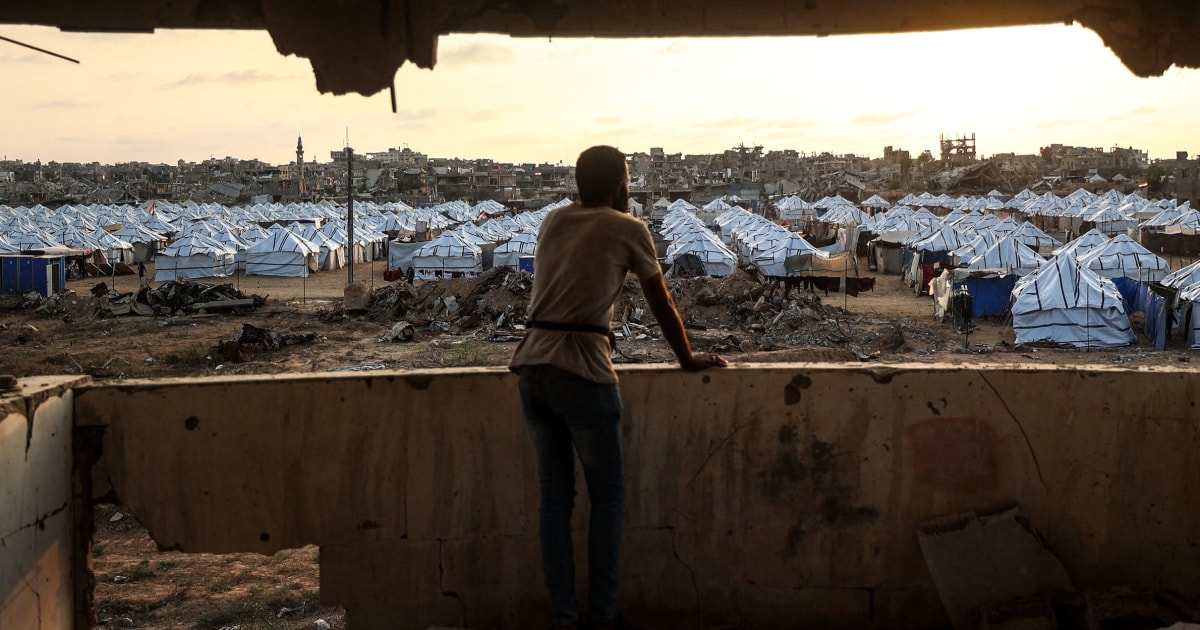President Donald Trump’s Gaza peace plan faces a crucial vote at the United Nations on Monday, with world powers still divided over whether it can convert a fragile ceasefire into the long-term solution that has eluded the Middle East.
Much about the plan remains uncertain, with occasional outbreaks of violence between Israel and Hamas threatening this tenuous diplomacy at every turn, and Palestinians inside Gaza suffering hunger and now flooding at the onset of a bitter winter.
The fraught path ahead was made clear even before the delegates took to their desks, with Israeli Prime Minister Benjamin Netanyahu — under pressure from his far-right coalition partners — denouncing the resolution’s outlining of a future Palestinian state. Hamas also warned against the U.S. proposal.
The 15-member U.N. Security Council is set to vote at 5 p.m. ET on the draft resolution of Trump’s plan. It needs nine votes to pass — but China or Russia could veto it outright.
Designed to usher Gaza from rubble-strewn warzone into a new era, the resolution backs establishing a “Board of Peace,” headed by the president himself, to temporarily govern the territory. Alongside that, an International Stabilization Force, known as the ISF, would take over responsibility from the Israel Defense Forces currently occupying parts of the Gaza Strip.
“I’m optimistic we’re going to see the resolution passed,” Mike Huckabee, the U.S. ambassador to Israel, told NBC News in an interview Sunday. “I do believe that we are on the brink of a historic realignment in the Middle East because President Trump has done things that I don’t think anyone else ever could have pulled off in bringing these countries together.”
The proposal would represent “phase two” of Trump’s 20-point plan first announced in September, “phase one” of which brought a prisoner and hostage exchange, as well as a ceasefire that has largely held despite accusations of violations from both sides.
At least 69,000 people have been killed in Gaza by Israel’s military offensive, most of them women and children, according to local health officials. Israel launched this after Hamas’ Oct. 7, 2023, terror attack in which 1,200 people were killed and another 250 were kidnapped.
Some Security Council members objected that the U.S. resolution made no reference of Palestinian statehood, according to The Associated Press. The draft now says that after the Palestinian Authority has “faithfully carried out and Gaza redevelopment has advanced, the conditions may be in place for a credible pathway to Palestinian self-determination and statehood,” the AP reported.
The resolution supporting the U.S. plan is backed by Arab states including Qatar, Egypt, the United Arab Emirates, Saudi Arabia and Jordan, as well as Turkey, Indonesia and Pakistan. Of these, the only ones on the Security Council are the U.S. and Pakistan, a non-permanent member, which therefore does not have a veto.
A joint statement from the U.S. and its backers said the “process offers a pathway to Palestinian self-determination and statehood” and “provides a viable path towards peace and stability, not only between the Israelis and the Palestinians, but for the entire region.”
Huckabee lauded Trump for having “assembled the Arab leaders and got them all to sign on the historic agreement.” On Palestinian statehood, he caveated that “the resolution does not call for the state but it does say that it lays the groundwork, providing that there are reforms that have been called for for a long time.”
Even so, the open door to Palestinian statehood within the resolution has angered the Israeli far-right, whose leading politicians are propping up Netanyahu’s government. Under pressure from them, Netanyahu came out Sunday saying that “our opposition to a Palestinian state in any territory has not changed.”
He told a meeting, “Gaza will be demobilized and Hamas will be disarmed, the easy way or the hard way. I don’t need reinforcements and tweets and lectures from anyone.”
The Hamas-led Palestinian Resistance Factions called the plan an “attempt to impose another form of occupation on our land and people” and called it “a violation of our national sovereignty and a continuation of our people’s suffering.”
As permanent Security Council members, China and Russia could veto the plan or abstain. If they opt out, the U.S. must find nine votes elsewhere, either from the other founding members, France and the United Kingdom, or the 10 non-permanent members on rotation: Algeria, Denmark, Greece, Guyana, Pakistan, Panama, Sierra Leone, Slovenia, Somalia and South Korea.
Defeat would rob Trump’s proposal of crucial international buy-in, casting the process into further uncertainty.
Meanwhile, the delegation from Moscow has tabled its own proposal, which contains stronger language supporting Palestinian statehood.
On a Monday call between Russian Foreign Minister Sergey Lavrov and his Iranian counterpart, Abbas Araghchi, they “emphasized the importance of achieving a lasting peace based on universally recognized international legal base,” according to a Russian readout of the conversation.

